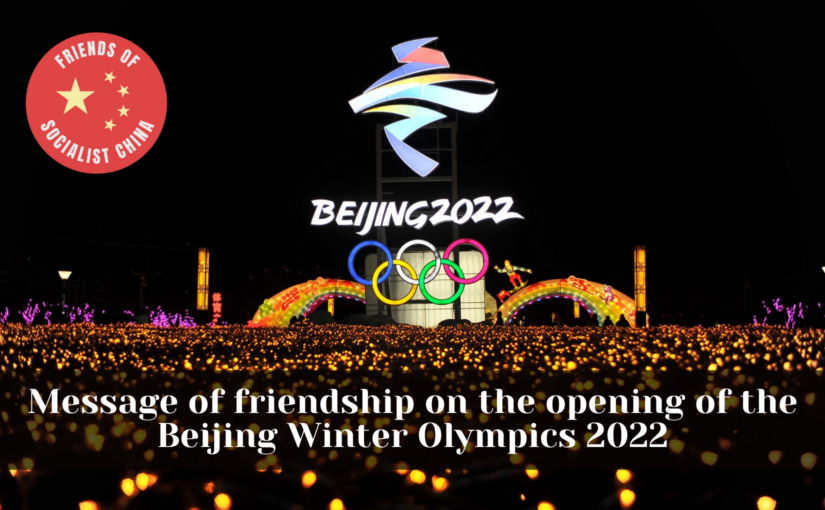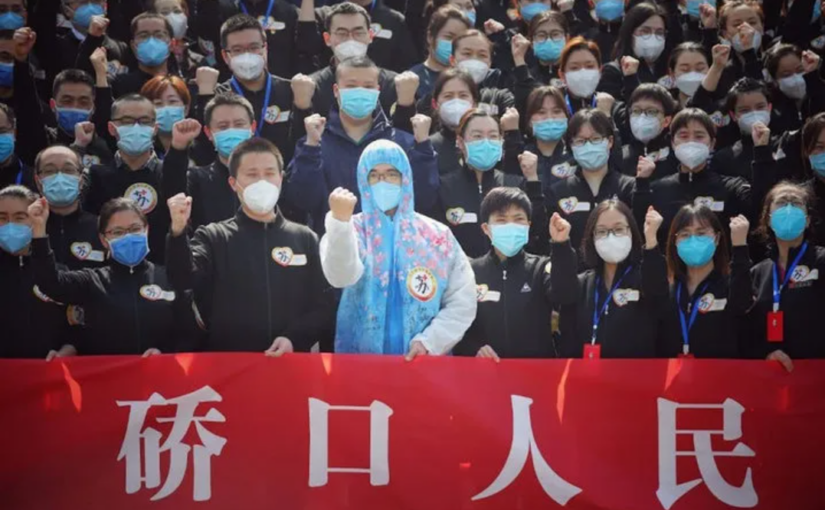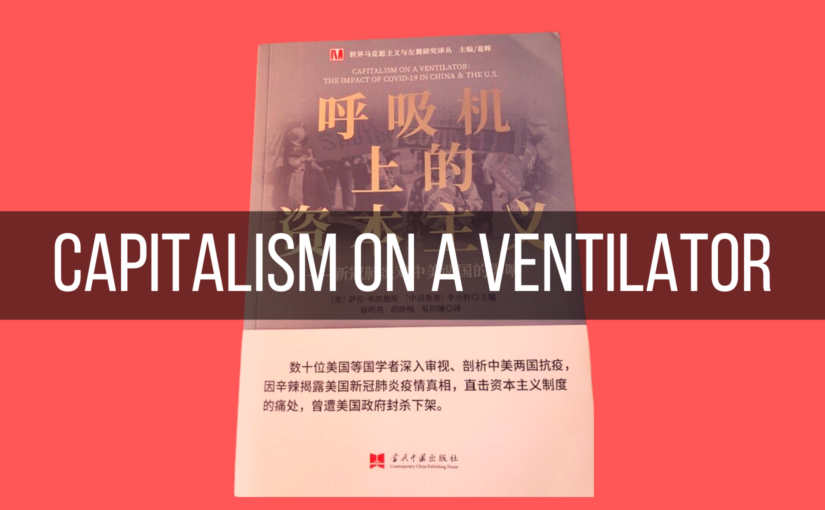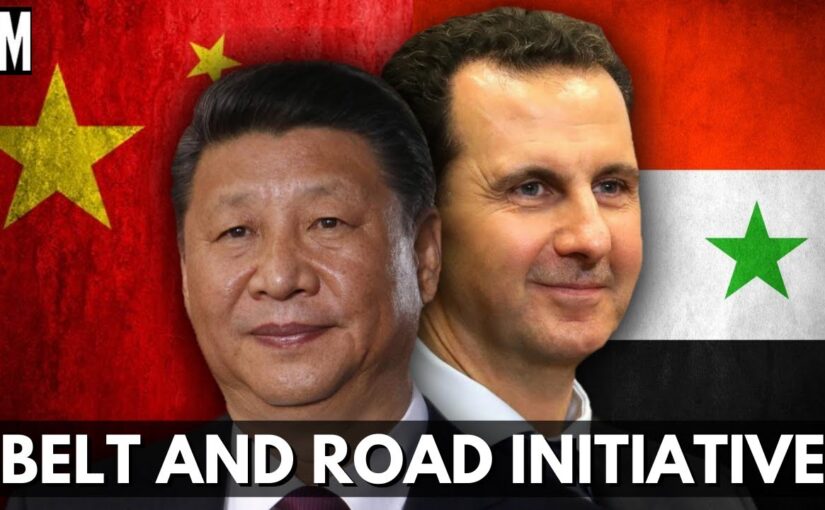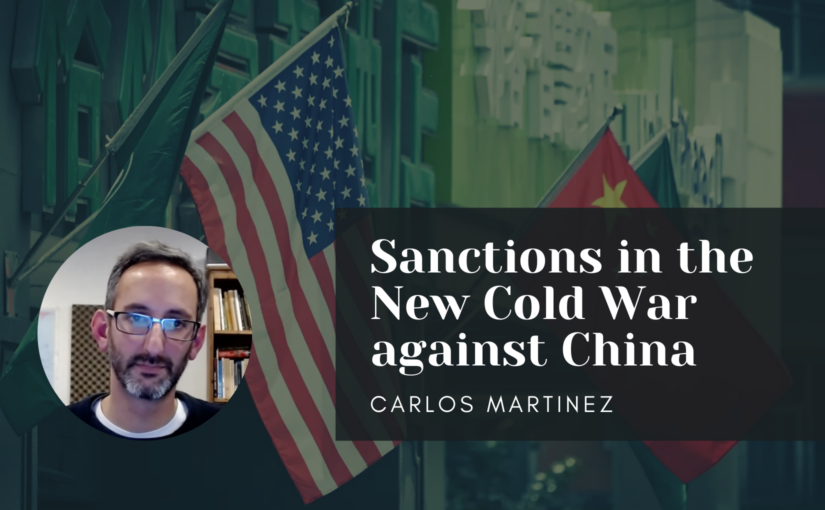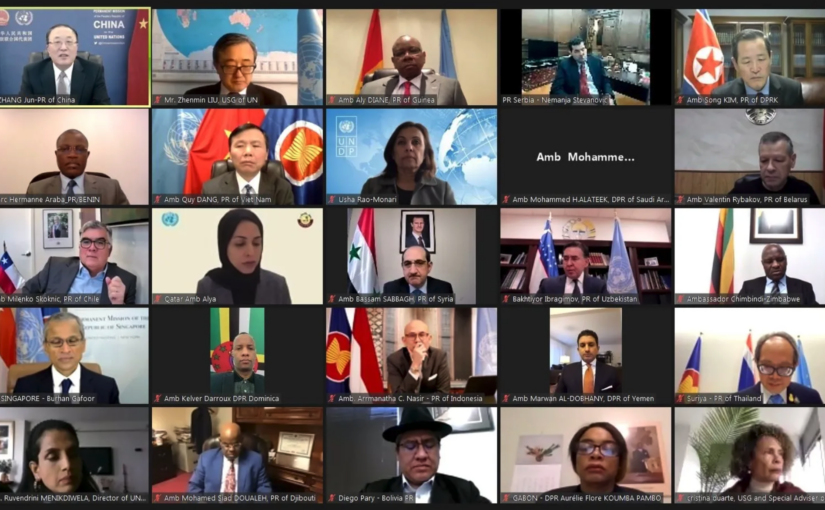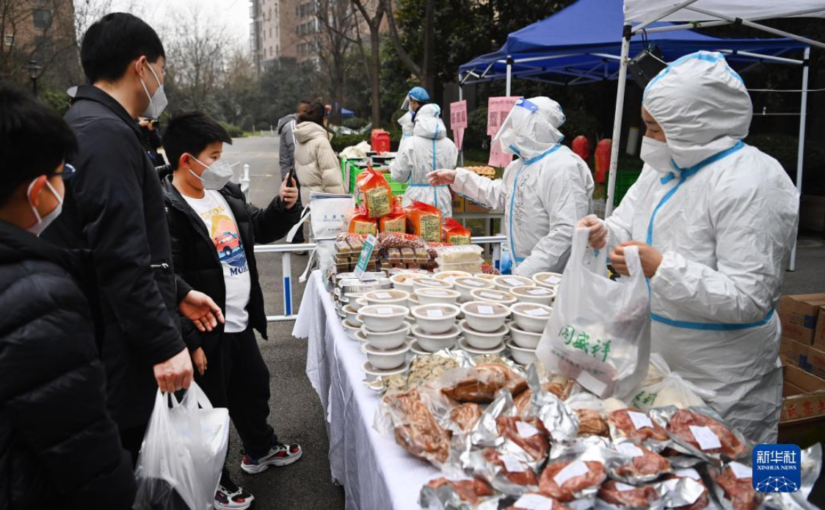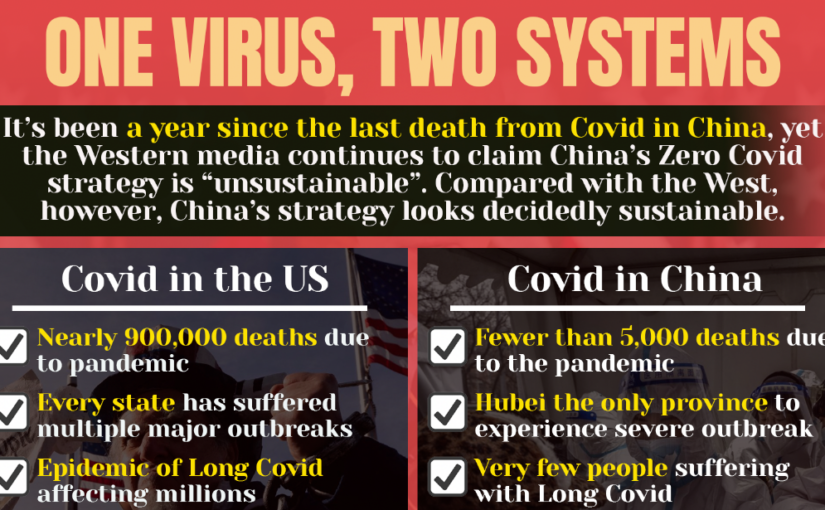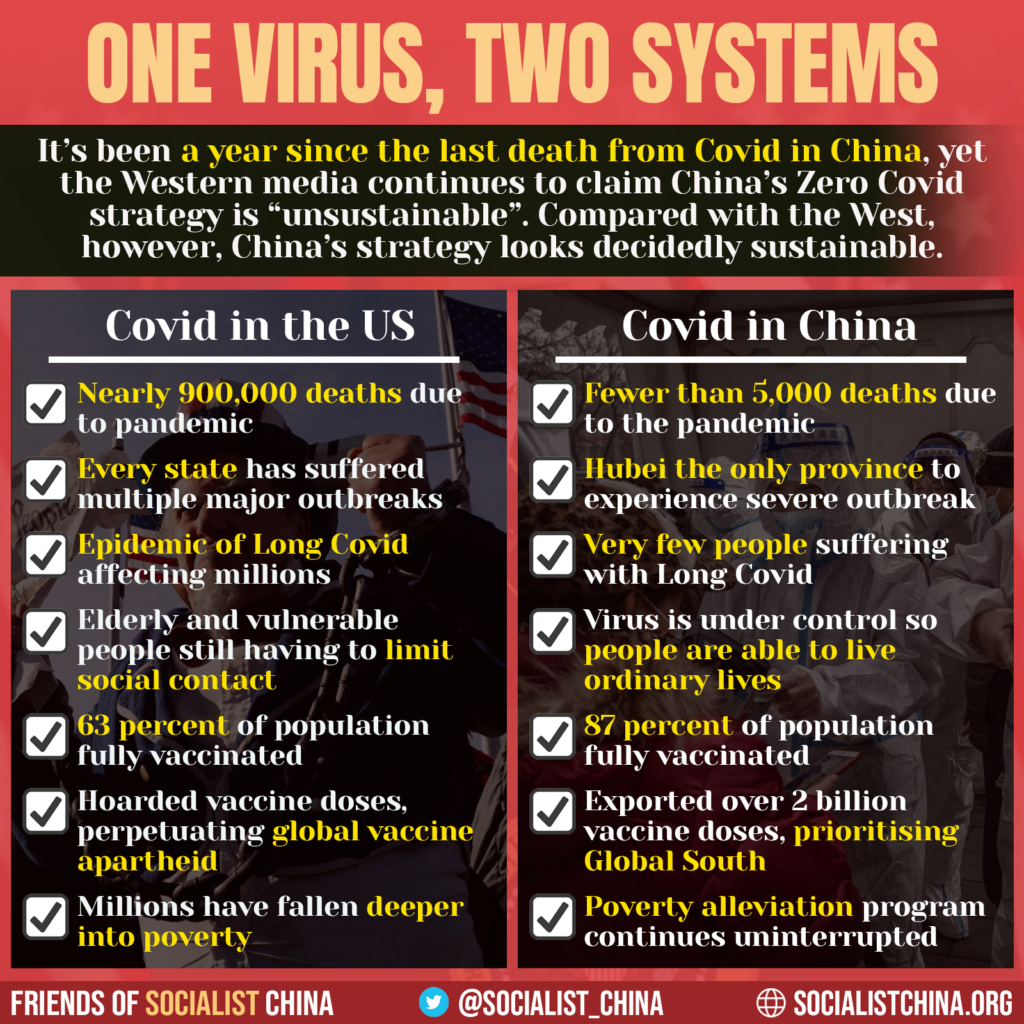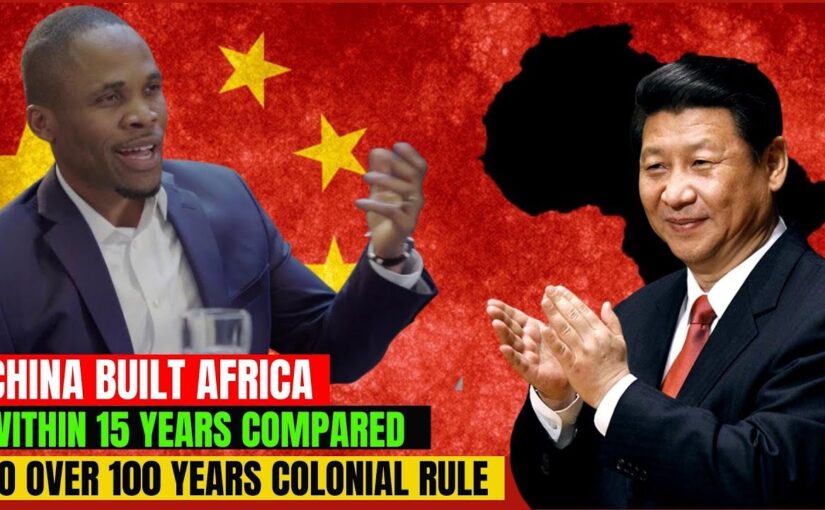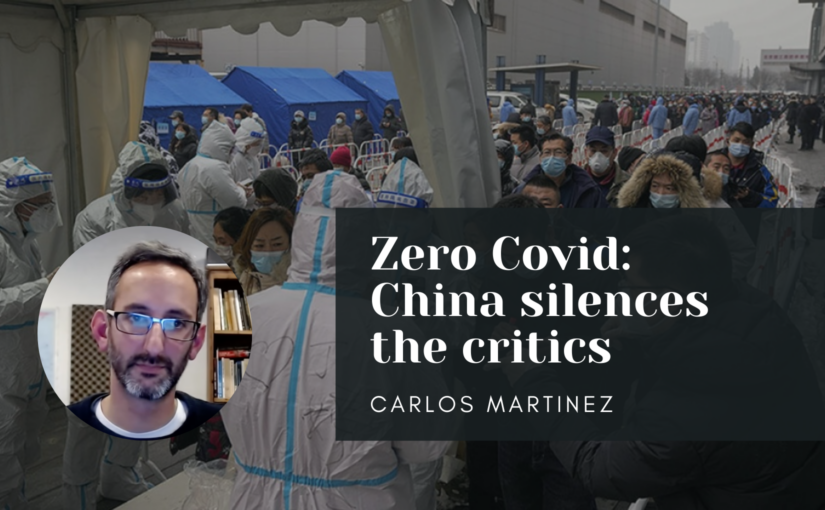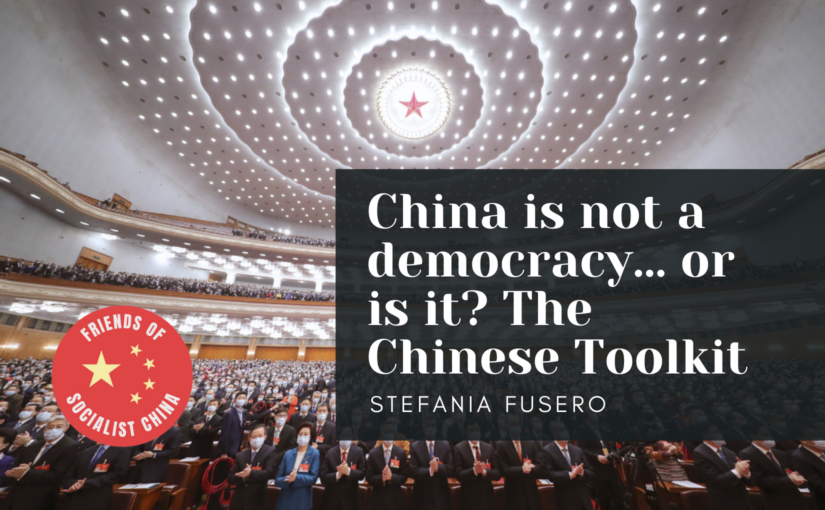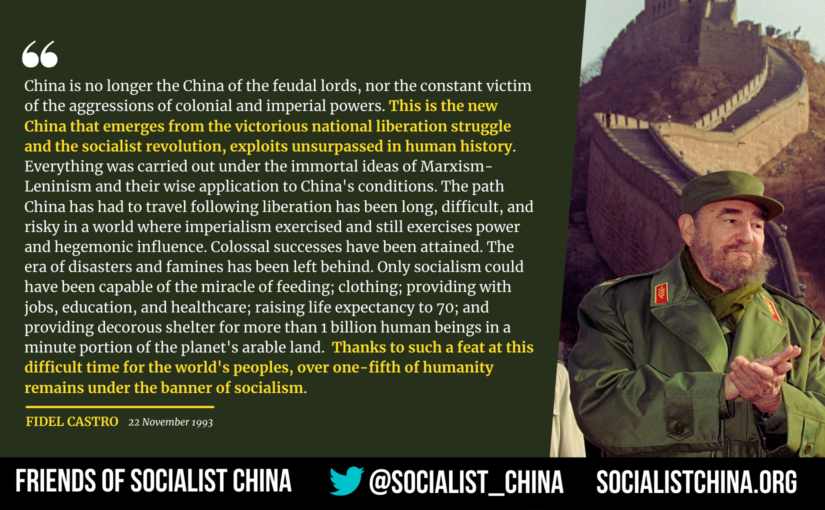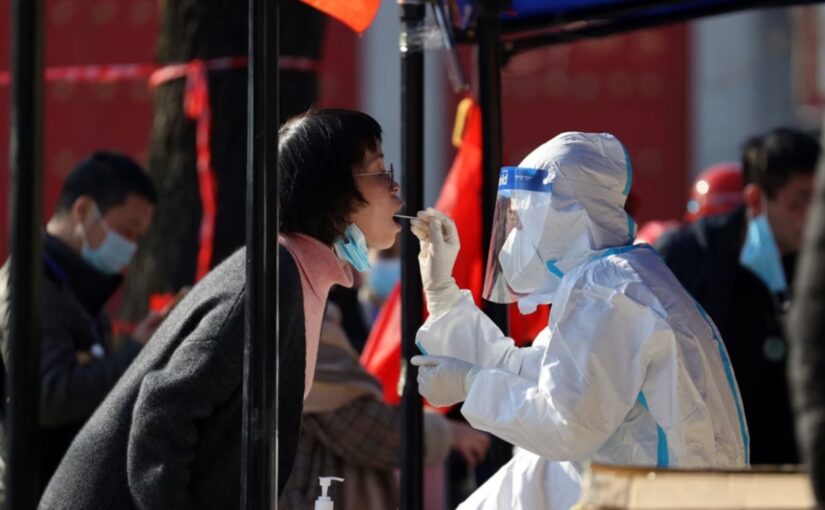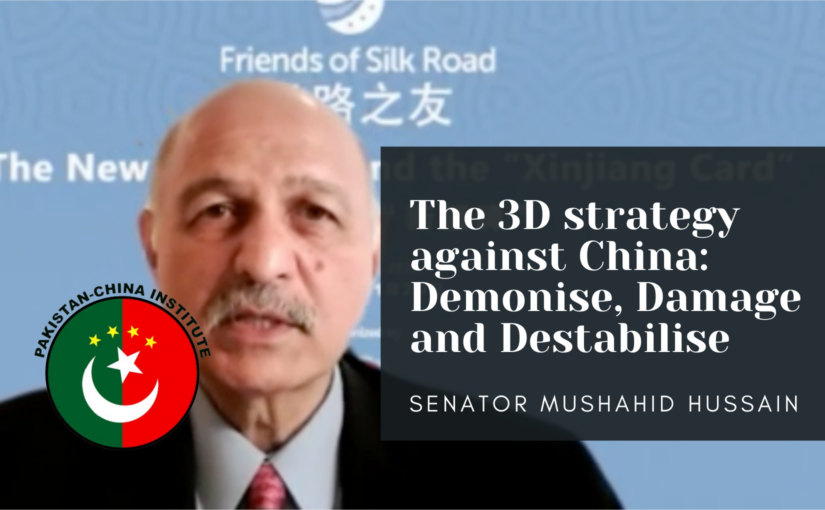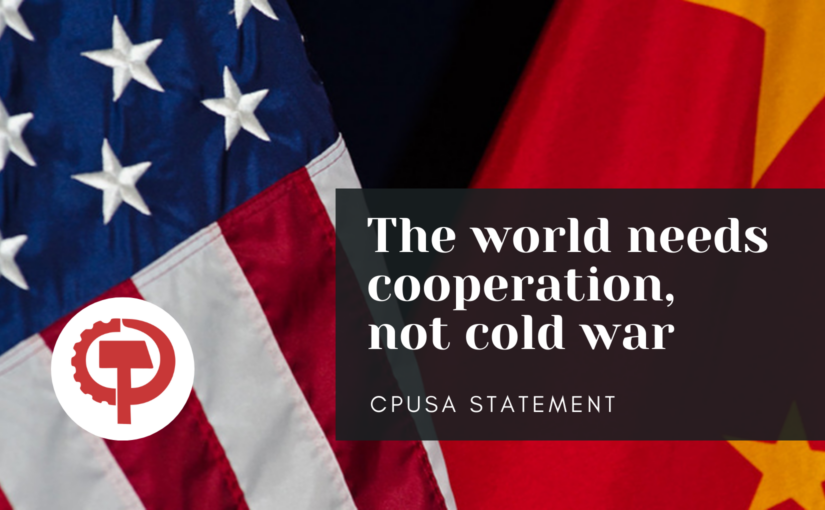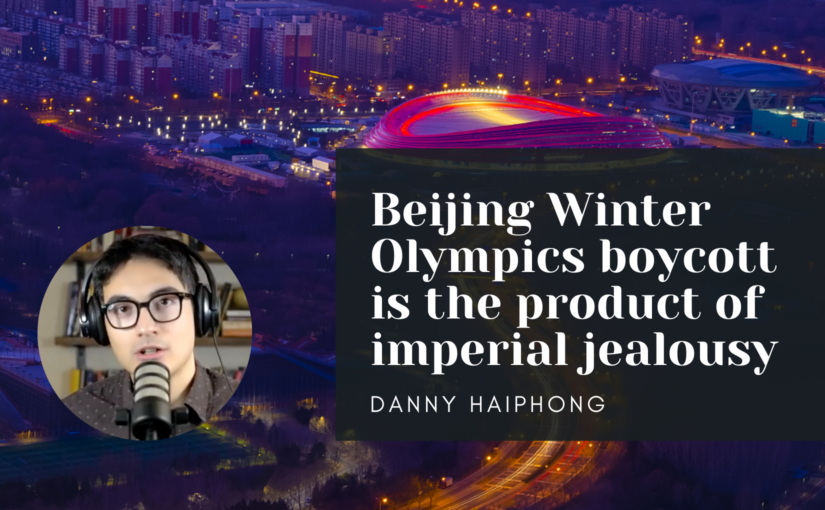The following article by Carlos Martinez features as a chapter in the forthcoming book Sanctions Kill – The World Stands Up. The article provides a detailed analysis of the sanctions imposed by the US and its allies on the People’s Republic of China and exposes the role they play within the escalating New Cold War.
Sanctions Kill – The World Stands Up will be published by World View Forum in early Spring 2022.
Background
The instinctive attitude of the United States towards the Chinese Revolution was of course one of hostility. In a protracted war between progress and reaction, between the future and the past, the governments of the US and the People’s Republic of China were, and are, are on opposite sides of the barricades. Hence shortly after the formation of the PRC in 1949, the US maintained a strict embargo on China.
With the move towards rapprochement in the early 1970s and a tacit agreement to ‘peacefully coexist’, the embargo was finally removed. Then with China’s strategic shift to integrate into the global economy, the trickle of trade and investment gradually expanded into one of the largest and most important economic relationships in the world, with bilateral trade volume currently standing at just over half a trillion dollars annually. Thousands of US businesses have generated enormous profits from their investments in China and (particularly in recent years) from selling to a vast and growing Chinese market.
Ruling classes in the West were, to a considerable extent, comfortable with incorporating China into globalised capitalism, to the extent that China’s role was limited to providing cheap, competent and well-educated labour. However, it was never the intention of the Chinese leadership to remain permanently at the lowest rung of the global economic ladder. China has pursued a patient strategy of welcoming foreign investment, setting up joint enterprises with Western companies, learning the latest technologies and management techniques, and building up its own advanced industry. Meanwhile it has invested very heavily in education and innovation. China’s R&D spending reached 378 billion USD in 2020 – 2.4 percent of its GDP and nearly three times the figure for the US.
As a result, China is on its way to becoming “a moderately developed socialist country by the middle of the 21st century”, as Deng Xiaoping predicted some 35 years ago.1 China has become a world leader in network technology, in renewable energy, nuclear energy, high-speed rail, artificial intelligence, nanotechnology, quantum computing, and several other important areas. It is increasingly competing with the US in spaces that the US is used to dominating, such as cloud computing and industrial automation.
The US ruling class has not responded favourably to all this. These uppity Asian communists refuse to stay in their lane! Columbia University economist Jeffrey Sachs recently described the response of US elites to China’s emergence as a science and technology powerhouse: “The basic attitude, if I could paraphrase, was: ‘how dare they do that? That’s what we do, not what they do. They’re a workshop, we’re the technology leader.’”2
China’s Belt and Road Initiative (BRI) has caused further discomfort. The Belt and Road, described by British political analyst Jude Woodward as “a vision of continental integration on a historic scale”,3 is a growing economic network underpinned by rapid infrastructure development – particularly high-speed rail, ports, and energy production and transmission. Beijing leads the financing and macro planning for this historic initiative. The expansion of the Belt and Road into large parts of Central Asia, Southeast Asia, the Middle East, Africa and further afield has become a major source of concern for those that seek to preserve US hegemony. In the words of US ‘elder statesman’ Henry Kissinger, the practical significance of the BRI will be to “shift the world’s centre of gravity from the Atlantic to the Pacific.”4 That is, China is creating a development path that isn’t defined by the US or US-controlled institutions.
In summary, the US ruling class finds itself in a position in which its role as sole economic, political and military superpower is under threat. To make matters worse, the source of this threat is a socialist, non-white, developing country which is working in concert with other countries towards the democratisation of international relations.
This is the overall context for the New Cold War, in which the US is the principal antagonist and China is the principal target. Just like the original Cold War (waged against the Soviet Union, the socialist countries and the Global South), the New Cold War is being fought on multiple fronts: political, military, ideological, propagandistic and economic.
Wave of sanctions under Trump and Biden
Then-secretary of state Hillary Clinton wrote in 2011 that “one of the most important tasks of American statecraft over the next decade will be to lock in a substantially increased investment – diplomatic, economic, strategic, and otherwise – in the Asia-Pacific region.”5 These words heralded the launch of the ‘Pivot to Asia’, which clearly identified China as the primary concern of US foreign policy in the modern era. But it was under the Trump administration that the New Cold War started to escalate in a serious way, with the initiation of a trade war – supposedly to put a stop to “the greatest theft ever perpetrated by anyone or any country in the history of the world.”6 Trump imposed a wide range of tariffs, unprecedented since the lifting of the trade embargo some 50 years ago.
Alongside the tariffs, the Trump administration imposed new US sanctions against China for the first time since 1989. In 2018, two of China’s top technology companies, Huawei and ZTE, were banned from providing equipment to any federal US agency. A year later, US companies were prevented from doing business with Huawei or its subsidiaries unless they had specifically been provided with a government licence – due to Huawei allegedly violating the US’s unilateral (and illegal) sanctions against Iran.
In the summer of 2020, the Trump administration announced two new sets of sanctions against China. Under the Uyghur Human Rights Policy Act, several senior Chinese officials were subjected to visa restrictions and asset freezing. Under the Hong Kong Autonomy Act, a number of top Hong Kong officials (including Chief Executive Carrie Lam) plus all 14 Vice Chairpersons of the National People’s Congress were subjected to similar punishment.
Things have only got worse in the first year of the Biden administration. In June 2021, Biden signed an executive order banning US citizens from investing in Chinese companies with alleged ties to the defence or surveillance technology sectors. The list of banned companies includes Huawei, China Mobile Communications Group, and Semiconductor Manufacturing International Corp (SMIC) – a key player in China’s bid to develop its homegrown semiconductor industry (semiconductors are a crucial component of modern electronic devices). The list of banned companies purportedly connected to the “Chinese military-industrial complex” was expanded in December 2021 to include SenseTime, which develops facial recognition technology.7
The Uyghur Forced Labor Prevention Act was signed into law on 23 December 2021. Startlingly, this Act inverts the principle of presumption of innocence, since it contains “a rebuttable presumption that goods mined, produced, or manufactured (wholly or in part) in China’s Xinjiang Uyghur Autonomous Region are made with forced labor, where goods designated as such will be subject to an import ban into the United States.”8 That is, there is a starting assumption that any item produced in Xinjiang incorporates forced labour. Any importer will have to provide “clear and convincing evidence” that goods have not been made with forced labour – a sufficiently high legal bar that, in practice, makes the Uyghur Forced Labor Prevention Act a blanket ban on all goods produced in Xinjiang.
Aside from these economic sanctions, the White House announced in December that it would be conducting a ‘diplomatic boycott’ of the 2022 Winter Olympics in Beijing, in light of “China’s egregious human rights abuses and atrocities in Xinjiang.”9
The State Department has also been strongly encouraging US allies to join its growing system of sanctions and boycotts. Britain, Canada and the EU imposed travel bans and asset freezes over alleged human rights abuses in Xinjiang, in parallel with the US’s sanctions.10 Canada, Britain and the European Union have also followed the US lead in passing Magnitsky legislation, providing for sanctions against individuals alleged to have committed human rights abuses. This essentially means that under a “unified set of rules”, US-imposed sanctions on individuals are automatically applied in those countries.11 Meanwhile, Australia, Britain and Canada have announced their support for Biden’s ‘diplomatic boycott’ of the Olympics.12
The overall picture then is one of steadily escalating sanctions against China over the course of the last four years, with the changed occupancy of the White House not impacting this trajectory in the slightest.
Sanctions as New Cold War propaganda
The typical motivation for imperialist sanctions is to foment popular unrest by causing serious economic harm; “making the economy scream”, like the CIA did in Chile when it had the temerity to elect a Marxist government.13 Sanctions against Zimbabwe, Cuba, Venezuela, Nicaragua, Iran, Syria, Belarus and the Democratic People’s Republic of Korea (DPRK) are manifestly designed with such a purpose in mind. Needless to say, such a strategy would have no chance of success in China, which is the second largest economy in the world and which is more than capable of imposing counter-measures that would cause significant damage to US business interests.
Sanctions against Chinese individuals over alleged human rights abuses in Xinjiang and Hong Kong will have very little effect on China’s economic growth; rather, such sanctions form part of a propaganda ‘full-court press’ designed to vilify China, to cultivate broad anti-China sentiment, and to build public support for the New Cold War. This propaganda is already having an impact; in the US, it has produced “a bipartisan consensus in Washington towards getting tough with China that is now extending to the broader public.”14
The propaganda surrounding the treatment of the Uyghur Muslim population of Xinjiang is particularly pernicious. This web of lies has been comprehensively debunked elsewhere, for example in an academic study by Eurispes,15 an extensive report by the International Action Center,16 and numerous investigative reports in the Grayzone.17 Suffice here to briefly note the following points:
1) While the State Department has accused China’s government of perpetrating a genocide in Xinjiang,18 absolutely no credible evidence has been supplied. As Jeffrey Sachs points out: “The charge of genocide should never be made lightly. Inappropriate use of the term may escalate geopolitical and military tensions and devalue the historical memory of genocides such as the Holocaust, thereby hindering the ability to prevent future genocides. It behooves the US government to make any charge of genocide responsibly, which it has failed to do here.”19
2) The reports and data analysis implicating the Chinese government in genocide, cultural genocide and forced sterilisation come almost exclusively from two sources, both utterly devoid of credibility. One is Adrian Zenz, a professional anti-China fanatic and senior fellow at the Victims of Communism Memorial Foundation who is apparently “led by God” to spread slanders about China.20 The other is the Australian Strategic Policy Institute (ASPI). ASPI is an Australian government think tank which receives funding from, among others, NATO, the US Department of Defense, the US State Department, Britain’s Foreign Office, Lockheed Martin, BAE Systems and Raytheon. In short, it is deeply involved in the business of New Cold War and the militarisation of the Pacific, and obviously cannot be relied upon to carry out unbiased research on China.
3) The Uyghur population from 2010 to 2018 increased from 10.2 million to 12.7 million, an increase of 25 percent. In the same period, the Han Chinese population in Xinjiang increased by just 2 percent (the differential is explained largely by the fact that national minorities were exempt from the One Child Policy).21
4) As to claims of ‘cultural genocide’, there are over 24,000 mosques in Xinjiang, a higher number of mosques per capita of Muslim population than Turkey.22 All schools in Xinjiang teach the Uyghur language. All road signs have both Uyghur and Chinese writing. Pakistan’s Ambassador to China, Moin ul Haque, returning from an observer mission to Xinjiang, described the region as “a mosaic of 50-plus ethnic minorities, and these ethnic minorities exist in a very peaceful and harmonious manner.”23
Western sanctions against China over human rights abuses in Xinjiang can thus be clearly understood as part of an elaborate campaign of information warfare. Nobody that has researched the question can seriously believe that a genocide is taking place in Xinjiang. Any sanctions are not designed to punish Chinese officials for misdeeds but to support an overall structure of disinformation portraying China as a malevolent force.
Trying to slow China’s rise
Thanks to China’s economic strength, the West can’t starve the Chinese people into submission through economic warfare. However, one important motivation for the steadily escalating sanctions regime is to attempt to decelerate China’s emergence as the world’s pre-eminent leader in advanced technology. The authors of a recent report by Harvard’s Belfer Center for Science and International Affairs observe that “China’s rapid rise to challenge US dominance of technology’s commanding heights has captured America’s attention.”24 The report notes that China has already established a leading role in several key areas and, “in others, on current trajectories, it will overtake the US within the next decade.”
One ‘choke point’ the US can leverage is its head start in the design and manufacture of semiconductors. As noted above, semiconductors are at the core of all electronic devices. Advances in semiconductors are driving – and will continue to drive – transformative change in a wide range of industries, from energy to medicine to space research. The Belfer Center report estimates that China is on course to become “a top-tier player in the semiconductor industry by 2030.” As such, preventing (or at least slowing) China’s emergence as a semiconductor superpower is a key priority for the US.
This issue goes beyond economics. If China outpaces the US in technological innovation, it will shift the entire global balance of forces; it will significantly weaken the ability of the imperialist powers to impose their will on the rest of the world; and it will showcase the fundamental validity of socialism as a means of propelling human progress. As Deng Xiaoping stated in 1984, “the superiority of the socialist system is demonstrated, in the final analysis, by faster and greater development of the productive forces than under the capitalist system.”25
Indeed, developments in technology in the coming decades form a crucial component of the material basis for the progression to a more advanced socialism. British researcher Keith Lamb writes: “China’s goal of building a modern socialist country by 2049 is predicated on mastering semiconductor technology which is the linchpin of the modern age, making innovations such as self-driving electric vehicles; fully-automated AI production systems, and supercomputers possible.”26
Such are the reasons for the wave of sanctions connected to the semiconductor industry. The US wants to restrict China’s ability to import semiconductors and, more importantly, to prevent China achieving self-sufficiency in semiconductor production. Blacklisting SMIC, China’s biggest manufacturer of computer chips, in December 2020, means that it is no longer able to source supplies from US companies. Chinese chip designers have been cut off from access to leading-edge chip design tools.27 Meanwhile Huawei has been prevented from importing chips, impacting its production of high-end smartphones.28 The US has been able to enforce many of these sanctions on an international scale, by virtue of its ‘long-arm jurisdiction’ – sanctioning non-US chipmakers that use US-made components. One notable absurdity here is that Taiwan, a region of China, complies with the US sanctions regime, and therefore Taiwan Semiconductor Manufacturing Company (TSMC) – the world’s most valuable semiconductor company – has been forced to stop its exports to the companies on the US Entity List, including Huawei.29
Unfortunately for US imperialism – but thankfully for China and the peoples of the world – this campaign of economic warfare is doomed to failure. As Radhika Desai notes, “US efforts to restrict chip supply to China will only increase its resolve to develop the necessary technology to produce the chips it needs domestically.”30 Indeed, according to market analysis firm GlobalData, US coercion is fomenting a “high octane, whole nation, everything-it-takes campaign to create a de-Americanized domestic semiconductor supply chain able to supply 75% of its needs by 2025” and achieve full self-sufficiency ten years later.”31
In the meantime, while stimulating China’s fast track to semiconductor self-sufficiency, sanctions are adversely impacting technology companies outside China, which for the last two decades has been the largest market for computer chips, in addition to being the ideal hi-tech manufacturing location. In recent years, the US semiconductor industry has derived over a third of its revenues from sales to China.32 These revenues have in turn fed into the R&D cycle and contributed to an impressive pace of innovation. It seems the US has settled on a ‘lose-lose’ strategy to replace the framework of cooperation that had brought significant benefit to both sides in recent decades.
Another area in which the US is using sanctions to gain a competitive advantage is solar power. China is by far the world’s largest producer of solar energy, with an installed capacity of 254 GW – more than three times that of the US, and growing fast.33 China also produces the bulk of the global supply of polysilicon (a key material in the production of solar panels). Johannes Bernreuter, author of the Polysilicon Market Outlook 2024, predicts that “China’s share in the global solar-grade polysilicon output will approach 90 percent in the coming years.”34
Unable to compete on price or productivity, the US has resorted to imposing sanctions on large parts of China’s solar panel industry35 – ostensibly on the basis of evidence-free and comprehensively debunked claims of the manufacturers using Uyghur forced labour.36 This is profoundly irresponsible and short-sighted behaviour. Chinese investment in solar technology over the course of the last 10-15 years has pushed the entire industry forward, and has brought prices down to a level where solar power is more cost-effective than fossil fuel alternatives in many parts of the world. This is an important contribution to the global struggle to prevent climate breakdown. The Western powers should be working closely with China and other countries on developing and deploying clean energy, rather than imposing sanctions with a view to gaining some fleeting economic advantage.
Unite to oppose hegemonism and Cold War
China is a leading voice opposing the West’s illegal sanctions regime, consistently using its role in international forums (including the UN Security Council and the G20) to oppose unilateralism and bullying. China has added its voice to the global demand to end the blockade on Cuba. Foreign Ministry spokesperson Zhao Lijian demanded last year that the US “immediately and completely lift unilateral sanctions against Cuba in compliance with the purposes of the UN Charter and basic norms governing international relations”, adding that China “resolutely rejects any external interference in other countries’ internal affairs, imposition of unilateral sanctions, and attempt to gang up on other countries.”37 China has consistently opposed unilateral sanctions against the DPRK,38 Zimbabwe,39 Eritrea,40 Afghanistan,41 Venezuela,42 Nicaragua,43 Syria,44 Iran45 and Belarus.46
With its strong opposition to sanctions, war, interference and hegemonism; through its pursuit of multilateralism and its support for the principles of the UN Charter; and through its consistent engagement with the countries of the world on the basis of equality, friendship, solidarity and mutual benefit, China is an indispensable force in the development of a new, multipolar system of international relations. Such a framework is desperately needed by the peoples of the world, and those of us living in the belly of the imperialist beast should do what we can to support it.
References
